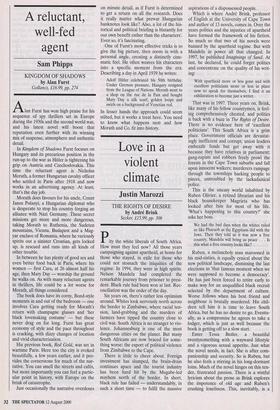A reluctant, well-fed agent
Sam Phipps
KINGDOM OF SHADOWS by Alan Furst Gollancz, .£16.99, pp. 274 Alan Furst has won high praise for his sequence of spy thrillers set in Europe during the 1930s and the second world war, and his latest novel will boost that reputation even further with its winning mix of suspense, atmosphere and authentic detail.
In Kingdom of Shadows Furst focuses on Hungary and its precarious position in the run-up to the war as Hitler is tightening his grip on Austria and Czechoslovakia. This time the reluctant agent is Nicholas Morath, a former Hungarian cavalry officer who settled in Paris after 1918 and now works in an advertising agency. At least, that's the day job.
Morath does favours for his uncle, Count Janos Polanyi, a Hungarian diplomat who is desperate to stop his country forging an alliance with Nazi Germany. These secret missions get more and more dangerous, taking Morath to Ruthenia, the Sudeten mountains, Vienna, Budapest and a Mag- yar enclave of Romania, where he variously spirits out a sinister Croatian, gets locked up, is rescued and runs into all kinds of other trouble.
In between he has plenty of good sex and even better food back in Paris, where his women — first Cara, at 26 almost half his age, then Mary Day — worship the ground he walks on. As with many reluctant agents in thrillers, life could be a lot worse for Morath, all things considered.
The book does have its corny, Bond-style moments in and out of the bedroom — one involves Cara getting ready for Morath's return with champagne glasses and 'her black lovemaking costume' — but these never drag on for long. Furst has great economy of style and the pace throughout is cracking, with dizzy changes of location and vivid characterisation.
His previous book, Red Gold, was set in wartime Paris. Here too the city is evoked beautifully, a few years earlier, and it pro- vides the cornerstone for much of the nar- rative. You can smell the streets and cafés, but more importantly you can feel a partic- ular point in history, with Europe on the brink of catastrophe.
Just occasionally the narrative overdoses on minute detail, as if Furst is determined to get a return on all the research. Does it really matter what prewar Hungarian banknotes look like? Also, a lot of the his- torical and political briefing is blatantly for our own benefit rather than the characters'. Even so, it's fascinating.
One of Furst's most effective tricks is to give the big picture, then zoom in with a personal angle, creating a distinctly cine- matic feel. He often weaves his characters into a specific moment from the era. Describing a day in April 1939 he writes:
Adolf Hitler celebrated his 50th birthday. Under German pressure, Hungary resigned from the League of Nations. Morath went to a shop on the rue de la Paix and bought Mary Day a silk scarf, golden loops and swirls on a background of Venetian red.
In lesser hands the approach could seem stilted, but it works a treat here. You need to know what happens next and how Morath and Co. fit into history.


























































 Previous page
Previous page